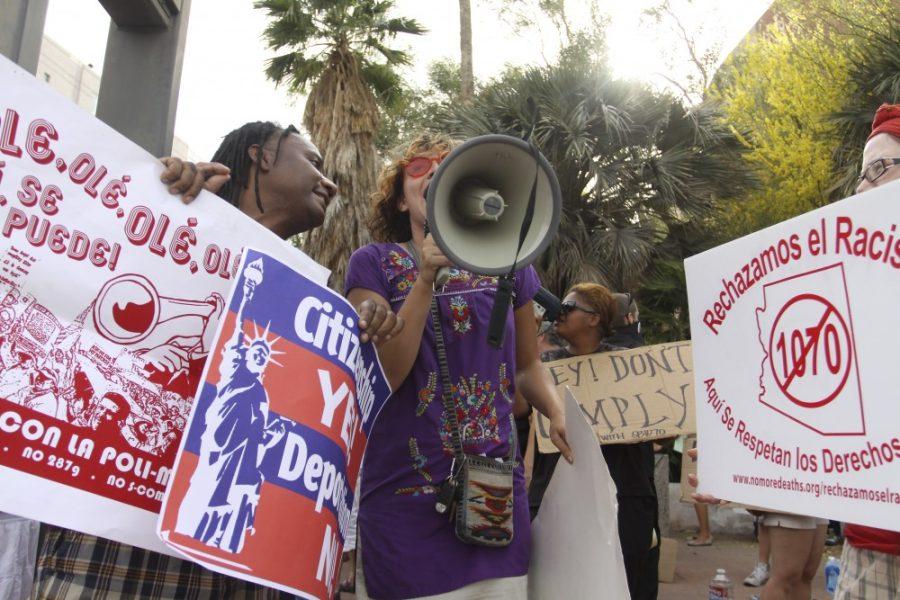Protesters gathered at the State Building downtown to express opposition to Senate Bill 1070 on Wednesday. Meanwhile, in Washington D.C., the Supreme Court heard arguments for United States v. Arizona, the Department of Justice’s lawsuit against the bill.
Gov. Jan Brewer signed SB 1070 into law two years ago. The bill states that it intends to “discourage and deter the unlawful entry and presence of aliens and economic activity by persons unlawfully present in the United States.” The Department of Justice questioned whether it’s constitutional for a state to create its own immigration laws separate from those of the federal government.
“I don’t think it’s an issue of constitutionality,” said Zoey Kotzambasis, a political science freshman and vice president-elect of the UA College Republicans. “I think it’s just an issue of federalism with the struggle of power between the states and federal government.”
Some stood on the northwest corner of Congress Street and Granada Avenue chanting “Si se puede!,” meaning “Yes we can!” Many protesters said they believe the bill is more than a power struggle between Arizona and the U.S. — they consider the law to be racist as well as a violation of human rights.
The bill, which allows law enforcement to ask people to verify their immigration status if they have “reasonable suspicion” that a person is an illegal immigrant, has caused controversy not only in Arizona but throughout the country.
“Unfortunately this type of law disproportionately affects Hispanics in Arizona. Not just undocumented Hispanics but all people of color,” said Robin Reineke, an anthropology graduate student. “I think it’s a really problematic and scary law.”
Activists held signs that read “SHAME,” “Anti-immigrant? Pick your own food!” and “Listen up Supreme Court!! Racism is unconstitutional!” They shook plastic bottles with pebbles, banged spoons against small pots and chanted through megaphones to ensure their message was heard.
“Despite laws like this that are meant to divide our community, people aren’t going to be afraid and are going to continue to stand up for justice,” said Geoffrey Boyce, a geography graduate student.
Boyce said the bill is shameful for the state and the broader political climate as it not only divides the community, but it also negatively impacts the economy. As more people leave the state either because they’re deported or simply because of the Arizona’s politics, he said, business decreases.
“We’re all ultimately affected by a law like SB 1070 because it’s really meant to divide our community,” Boyce said. “But certainly, there are many people who are affected much more than I am and so I feel an obligation to be out here and to speak out.”
Adelina Lopez, a sophomore at Pima Community College and a member of Border Action, an organization that works with border and immigrant communities on legislative education leadership development and community organizing, said she is afraid she will be racially profiled because of the bill. Born in Hermosillo, Sonora, Mexico, Lopez moved to Tucson when she was 5 years old. While applying for legal documentation, her younger brother was asked by the American government to go to Juarez, Chihuahua, Mexico for his immigration appointment. He was then told he’d have to wait 10 years before he could become a citizen of the U.S.
“Juarez, right now, is a dangerous city,” Lopez said. “You lose trust in … politics, politicians.”
Many people think crossing the border illegally is a choice, which according to Reineke, is an oversimplified notion of the reasons people sneak into the United States. Illegal immigrants are forced to come to America illegally because they would otherwise live in severe poverty with no hope for their families’ future, she added.
“The border has been left porous for a reason … the U.S. economy relies on their (immigrants’) labor,” Reineke said. “We just don’t want them to have equal rights, which I think has to do with racism.”
Since SB 1070 was signed, the crime rate in Arizona has dropped “three times faster than the national average,” according to Sen. Frank Antenori’s website. Antenori co-sponsored SB 1070 and represents Legislative District 30, which includes land just north of the border.
“It is an attempt to assert our state’s sovereignty and I think that that is completely constitutional,” Kotzambasis said.








